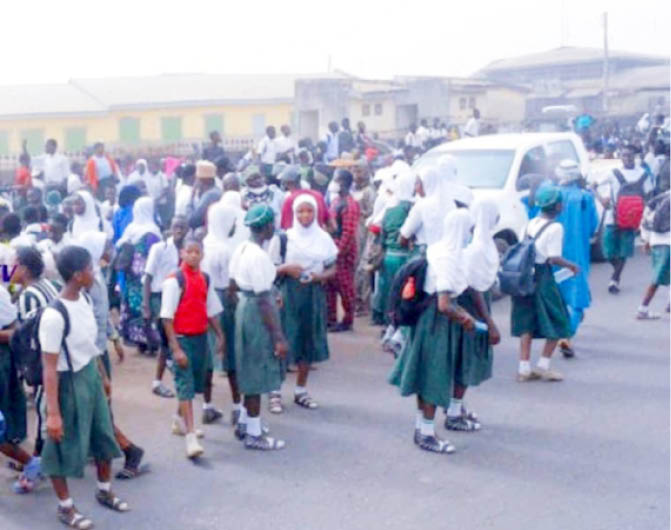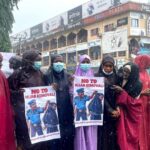By Bashir Ibrahim Hassan
Was it pure coincidence that, as trouble was brewing in Kwara State recently, a solution to its kind was being considered in the lower House of the National Assembly in the capital territory Abuja? The trouble in Ilorin was over the refusal of some Christian faith schools to allow their Muslim students wear hijab to the schools.
- 100 northerners leave Imo as 8 killed, 6 injured in fresh attack
FG plans new salary package for judges
The solution to this impasse was the debate on the ‘Religious Discrimination (Prohibition, Prevention) RDPP Bill, 2021, derisively tagged Hijab Bill by a section of the Nigerian media. Both events sparked heated and often emotional debates that, at the bottom of it all, threaten to negate Nigeria’s multicultural identity and reality.
The whole idea in Kwara of the proprietors of the schools banning hijab-adorning Muslim students and their sympathisers can be reduced to what not to wear in public. This is also the major part of the concern of the RDPP Bill before the House of Representatives—the humiliation and denial of opportunities female Nigerians are faced with because of what they wear in public. The former is clearly in breach of the fundamental human rights of the Muslim students to express their faith without discrimination; even though the school may have their defence for taking such a position. The latter is trying to assert this right not only for Muslims but also Christians wherever or whenever they are threatened with discrimination based on their professed faith.
Running through the argument of the proprietors of the Christian faith schools in Kwara, one could easily understand the pragmatic appeal of the argument that Muslim children should go to other schools elsewhere if they don’t want to conform. The problems with this argument are many. First, to say Muslim students should go elsewhere unless they conform to the school’s rule on uniform does very little to promote inclusiveness, which is the bedrock of our multicultural and multi-religious society. Secondly, the position begs the moral question: is it justifiable to base a school rule because of Christian majoritarian nature of the school?
Then, thirdly, the go elsewhere argument appears to ignore the difficulties in changing a school for a child. The inconvenience is huge. The act of changing schools for a child, educational psychologists will tell you, interferes negatively with not only its emotional but academic development too. Finally, the Christian faith schools by themselves risk what is called ghettorization by concentrating students with the same religious beliefs in particular schools. The social cost this exacts on the society is enormous.
The Commissioner for Education, Kemi Adeosun, argues, when speaking to the press, that “the government is convinced that its policy to allow willing Muslim schoolgirls to wear their hijab in public schools will lead to sustainable peace and communal harmony anchored on mutual respect and understanding”.
In a country that guarantees freedom of religion, signed the declaration of International Human Rights, the basic question to ask is: how justifiable is it to deny a Nigerian child access to a school of its choice on the basis of the manifestation of its religion?
It is a great concern because Nigeria is a signatory to the Universal Declaration on Human Rights (UDHR). The UDHR insists that all human beings are free and equal, regardless of colour, creed or religion. It contains 30 articles on rights and freedoms that include, among others, civil and political rights, like the right to life, free speech and privacy. It also includes economic, social and cultural rights, like the right to health and education. I find articles 18 and 26 of UDHR very relevant to the issue under consideration and quote them in full below:
Article 18: Everyone has the freedom to think or believe what they want, including the right to religious belief. We have the right to change our beliefs or religion at any time, and the right to publicly or privately practise our chosen religion, alone or with others.
Article 26: Everyone has the right to education. Primary schooling should be free. We should all be able to continue our studies as far as we wish. At school we should be helped to develop our talents, and be taught an understanding and respect for everyone’s human rights. We should also be taught to get on with others whatever their ethnicity, religion, or country they come from. Our parents have the right to choose what kind of school we go to.
These types of laws were the instruments that gave Muslim ladies like Ilhan Omar the equality to sit in the House of Representatives in the US wearing her Hijab without any form of molestation or discrimination. Ilhan Abdullahi Omar is an American politician serving as the U.S. Representative for Minnesota’s 5th congressional district since 2019.
Enter the RDPP. It is a bill sponsored by the Deputy Chairman of the House of Representatives’ Committee on Finance and member representing Bida/Gbako/Katcha Federal constituency of Niger State, Hon. Saidu Musa Abdullahi. The bill is seeking to address discriminatory conducts and prohibit religious discrimination concerning hiring or recruitment, terms and conditions of employment. It will prohibit qualifying/professional bodies, educational institutions, employment agencies, and other sectors from discriminating against persons, students or personnel based on their religious belief or its manifestation. When passed, the law will bury issues such as what we saw in Kwara for good.
It will also address the bigotry of some employers, or those executives who take their prejudice to public office and allow it to becloud their sense of judgment.
The law should be a welcome development. After all, it is only to expand and expatiate the provisions of Nigeria’s constitution and the UDHR document as explained above. It is in line with similar laws passed recently in the country seeking to tackle social menace and harmful cultural practices—the Disability Law and the Violence Against Persons Prohibition (VAPP). While disability seeks to eradicate all forms of discrimination based on a person’s disabilities, VAPP is addressing domestic and other gender-based violence in the country.
One at a time, our representatives in the legislative chambers are tackling the social menaces bedeviling our country through legal instruments. They are addressing these social ills not because there were no prior generic laws that cover them but because they need to be addressed more comprehensively to leave no room for opacity. While UDHR may seem like a far, distant document with no instrument of enforcement, the RDPP Law and others like it are provided to allocate punishments for offenders.
Contrary to the view of its critics, as far as the RDPP Bill is concerned, there is nothing to show attempts at seeking the enthronement of a state religion on any state that may domesticate the law eventually. It does not go against Section 10 of the Nigerian Constitution that says “The Government of the Federation or of a State shall not adopt any religion as State Religion.” To peddle this argument, because the bill calls on the general public to respect the rights of Muslim women that wear Hijab in public spaces smacks of Islamophobia only.
In the final analysis, to deny a Nigerian – male or female – his or her religious freedom negates our multicultural pretenses. It negates the concept of equality, and basic human right as enshrined in Nigeria’s constitution and the Universal Declaration of Human Rights legal document. A bill that will criminalize such decimations based on religious grounds, like the RDPP bill, is a welcome development.
Bashir wrote from Abuja

 Join Daily Trust WhatsApp Community For Quick Access To News and Happenings Around You.
Join Daily Trust WhatsApp Community For Quick Access To News and Happenings Around You.

